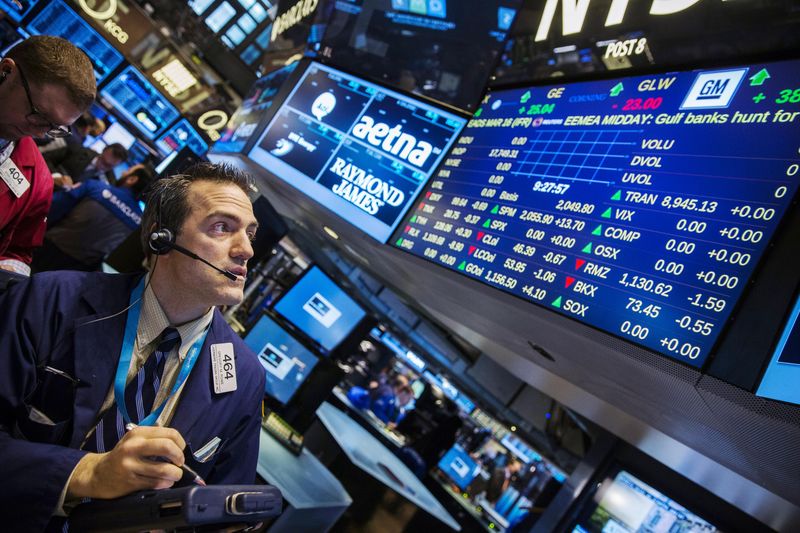* European stocks snap three-day winning streak
* Wall Street futures fall after Wednesday's rally
* Oil gains after group pushes for 1.5 mln bpd output cut
* Coronavirus still causing deaths, economic dislocation
* Dollar softens, U.S. yields again dip below 1%
By Karin Strohecker
LONDON, March 5 (Reuters) - European shares fell again on Thursday, taking their cue from U.S. equity futures, which implied a lower open for Wall Street as cases of the coronavirus surged in the U.S.
European markets snapped a three-day winning streak with bourses in London .FTSE , Frankfurt .GDAXI , Paris .FCHI and Milan .FTMIB dropping as much as 1.4% amid mounting evidence of the damage the coronavirus outbreak was inflicting.
Futures for U.S. stocks pointed to more pain ahead. E-Minis for the S&P 500 ESc1 fell nearly 2% after California declared a state of emergency as coronavirus cases increased.
"European stocks are now catching with the downward trend, dragged by a wave of profit warnings," said Stephane Ekolo global equity strategist at TFS Derivatives. "U.S. futures are down due to fears the situation could worsen after California declared a state-wide emergency."
Europe's losses came after MSCI's broadest index of Asia-Pacific shares outside Japan .MIAPJ0000PUS added 0.7% in a fourth day of gains. The gains came after the Dow .DJI and S&P 500 .SPX surged more than 5% on Wednesday while the Nasdaq .IXIC nearly matched their gains .N .
U.S. stocks on Wednesday found relief in Joe Biden's performance in the campaign for the Democratic presidential nomination. Biden is considered less likely to raise taxes and impose new regulations than rival Bernie Sanders. to the momentum was an approval by the U.S. House of Representatives of an $8.3 billion funding bill to combat the spread of the coronavirus. The emergency legislation followed a surprise rate cut by the U.S. Federal Reserve on Tuesday. coronavirus epidemic showed no signs of slowing, with deaths mounting globally.
"There is little doubt that the COVID-19 outbreak will slow global growth considerably this quarter, and we expect it to actually produce a rare non-recessionary contraction in GDP," said JPMorgan (NYSE:JPM) economist Joseph Lupton.
He noted the bank's all-industry PMI measure of activity for February slumped 6.1 points, the largest one-month drop on record, and at 46.1 was at its lowest since May 2009.
The Federal Reserve and Bank of Canada have both responded by cutting interest rates by 50 basis points. Markets in the euro zone are pricing in a 90% chance that the European Central Bank will cut its deposit rate, now minus 0.50%, by 10 basis points next week.
"We have to get past the threshold where COVID-19 shifts from panic to headline exhaustion and subsequent news on it becomes more and more of a fade," Tom Porcelli, chief U.S. economist at RBC Capital Markets. "Then risk assets can move higher in earnest."
Ten-year Treasury yields fell below 1% again US10YT=RR , trading last at 0.9745%. Yields have fallen for 11 straight days, the longest slide in at least a generation.
The dollar index =USD softened 0.2%, with the euro trading at $1.1170 EUR= , heading back towards a two-month high of $1.1212 hit earlier in the week. The dollar hit a fresh five month low of 106.78 yen JPY= , up from a five-month low of 106.84. USD/
Gold steadied after jumping when the Fed cut rates. It was last at $1,638.97 per ounce XAU= . GOL/
Oil prices rose with OPEC agreeing to cut output by an extra 1.5 million barrels per day in the second quarter of 2020 to support prices, conditional on Russia joining in, two OPEC sources said. Oil prices have fallen around a fifth since the start of the year. Brent crude LCOc1 futures stood at $51.57 a barrel; U.S. crude CLc1 at $47.16. O/R
https://tmsnrt.rs/2zpUAr4 Asia-Pacific valuations
https://tmsnrt.rs/2Dr2BQA
^^^^^^^^^^^^^^^^^^^^^^^^^^^^^^^^^^^^^^^^^^^^^^^^^^^^^^^^^^^>
